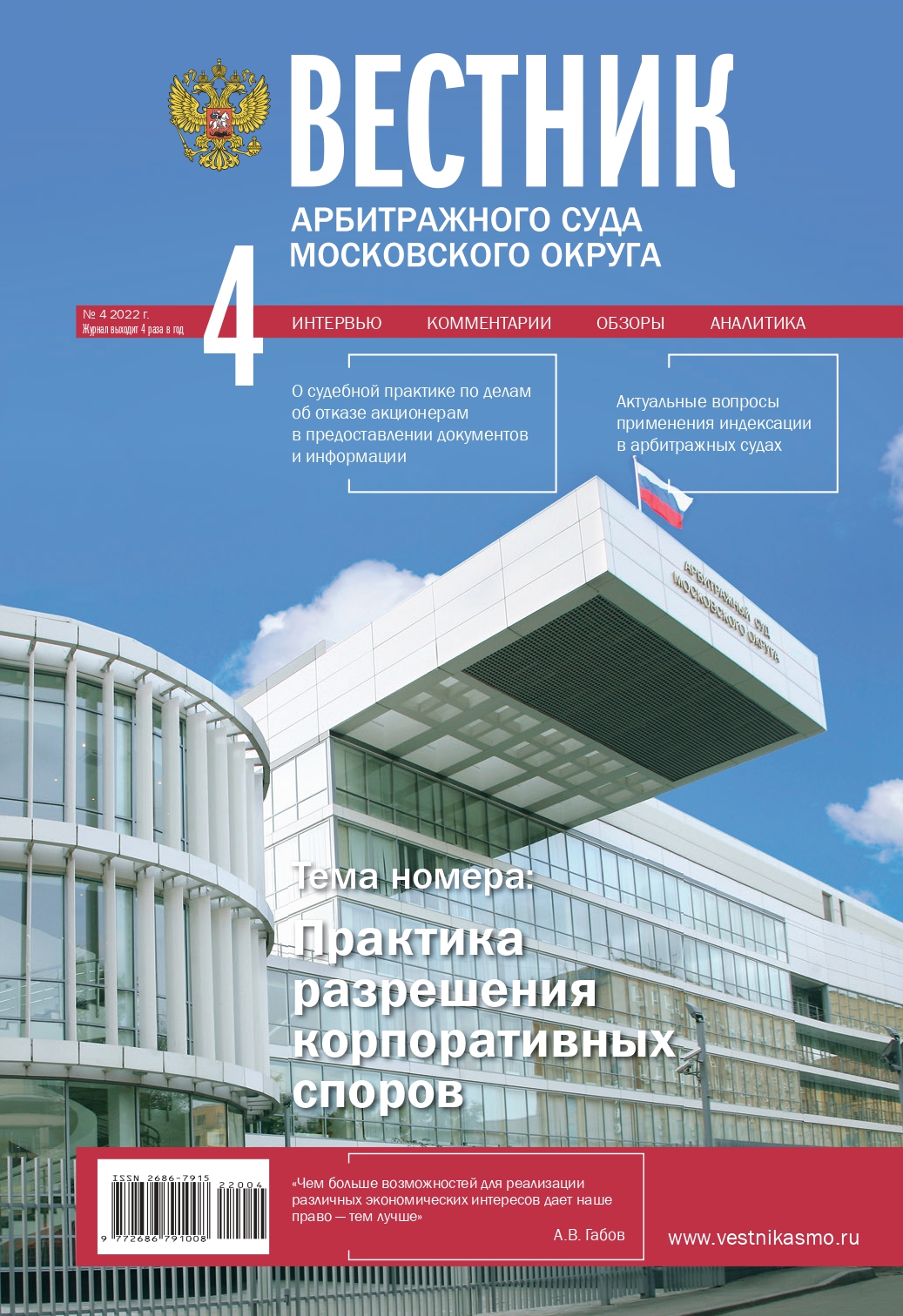Courts News
News of Moscow District Courts
Interview of the issue
A.V. Gabov. The more opportunities our law affords to pursue various economic interests, the better
Topicality
Exclusion of a Person from a Limited Liability Company as an Extraordinary Measure of Responsibility
Analytics: Practice of Corporate Disputes Resolution
D.V. Lomakin
Problems of civil liability of persons that controlled an inactive limited liability company excluded from the unified state register of legal entities The article is devoted to the problems of subsidiary liability of persons who controlled a limited liability company that was administratively excluded from the unified state register of legal entities. The article discusses the grounds and procedure for exclusion of a legal entity from the register, the conditions of liability of the persons who controlled it to the creditors of a limited liability company, determines the nature of such liability. The problematic issues of application of the norms on subsidiary liability of persons who controlled a legal entity in time are investigated.
Keywords: corporation, limited liability company, liquidation of a legal entity, sole executive body of a business company, lifting the corporate veil, subsidiary liability of persons controlling a corporation
DOI: 10.46279/ASMO.2022.39.32.001
V.A. Laptev
Civil-legal community in the corporate management system: tasks of the legislator and the realities of judicial practice
Inclusion in the Civil Code of the Russian Federation of the category “civil legal community” determined the future development of the system of normative regulation of corporate relations. This circumstance is also confirmed by the judicial practice that has developed in recent years. This paper examines the legal nature of the category under consideration in conjunction with the consequences of its inclusion in corporate law. An overview of possible options for interpreting and disclosing the civil law community, as well as its relationship with the categories “corporation”, “organ of the corporation” and “general meeting” with examples of judicial practice is given. The place of civil-legal communication in the corporate management system is determined. The variety of approaches and the practical value of introducing the concept of a civil law community for corporate disputes are substantiated.
Keywords: general meeting, competence of the meeting, corporation, management of the corporation, civil law community, group of persons
DOI: 10.46279/ASMO.2022.39.32.002
O.A. Makarova, V.F. Popondopulo
Judicial review in cases of denial of documents and information to shareholders
A joint-stock company has the right to deny of documents and information to shareholders if at least one of the conditions listed in clause 8 of Art. 91 of the Law on Joint-Stock Companies. The article provides judicial review in cases related to denial of documents and information after shareholders’s demand. Attention is drawn to the fact that the use in the Law on Joint-Stock Companies evaluation categories creates certain difficulties in the practice of arbitration courts. In particular, such evaluation categories include the concept of «sound business purpose», «insufficient interest», «apparent discrepancy», «bad faith» of the shareholder. The authors conclude under what conditions a business purpose can be considered sound.
Keywords: shareholder’s right to information, sound business purpose, electronic version of the document, free access
DOI: 10.46279/ASMO.2022.39.32.003
V.A. But’ko
Peculiarities of consideration of corporate disputes on exclusion of members from the membership of a company
The author addresses the peculiarities of corporate disputes on the exclusion of participants from the company as the most complex issue in the Russian law enforcement practice, since in each case the courts assess the significance of the circumstances that the plaintiff refers to as a basis for the exclusion of the participant from the society. The article analyses court practice of consideration of this type of corporate disputes, reveals the grounds for exclusion of a participant from the company by the example of limited liability companies and also marks out the peculiarities of consideration of corporate disputes on exclusion of participants from the company. It is concluded that each corporate dispute is unique and the choice of such special corporate method of protection of the company’s rights as the exclusion of the participant, often does not restore violated rights and legitimate interests of the company. In this case, despite the fact that a number of issues in the framework of corporate law remains unresolved, we can talk about the formation of a stable judicial practice on the consideration of this category of disputes, which is due to the importance and effectiveness of the legal positions expressed by the Supreme Court of the Russian Federation.
Keywords: corporate conflict, special corporate way of protection of right, limited liability company, exclusion of participant from society, mutual claims for exclusion of participant from society
DOI: 10.46279/ASMO.2022.39.32.004
Analytics: Open Tribune
A.A. Alekseeva, I.Yu. Kovaleva
Current issues in the application of in dexationin arbitration courts
The article analyzes the issues arising currently in connection with the adoption of the Federal Law of 11.06.2022 № 177-FZ “On Amendments to Article 183 of the Arbitration Procedure Code of the Russian Federation”. The problem of correlation between indexation and civil law mechanisms of compensation for losses is touched upon. The notion of indexation as a procedural mechanism of compensation for inflation losses is disclosed. In the article the questions of application of limitation period to the requirement about indexation, and also the practical questions arising in judicial practice at application of article 183 of the Arbitration Procedural Code of the Russian Federation are investigated.
Keywords: indexation, arbitration process, inflationary losses, inducement to execution of a judicial act, execution of a judicial decision
DOI: 10.46279/ASMO.2022.77.43.001
O.N. Shemeneva
Consequences of the parties recognition of the civil cases circumstances and the conclusion of agreements regarding the circumstances of the case in the arbitration process
The article attempts to answer the question of whether a party that has made a recognition or entered into an agreement on the circumstances of the case can refuse these procedural actions. According to the results of the study, the author concludes that after the acceptance of the party recognition by the court, the burden of proving the indisputable circumstance is redistributed: the court proceeds in its activities from the assumption that this fact exists; the party that bases its demands or objections on it no longer proves it; but the admitted party is not deprived of the opportunity to present evidence to refute the confession.
Keywords: court, parties, circumstances, recognition, burden of proof
DOI: 10.46279/ASMO.2022.39.32.005
N.N. Tkacheva
Refusal of a claim in the claim proceedings — a guarantee of judicial protection and a procedural institution or a transaction in its classical sense?
Analyzing the traditional procedural institution of the plaintiff’s refusal from the claim in the context of guarantees of judicial protection of rights and interests, the article examines the question of the admissibility of appealing the decision to accept the refusal of the claim as a transaction on bankrupt grounds provided for by the Federal Law “On Insolvency (Bankruptcy)” committed with the purpose of concealing the assets of the debtor and causing harm to creditors. The article concludes that it is possible and necessary to appeal the rulings on the acceptance of the refusal of the claim by interested parties in the framework of the bankruptcy case, as well as the inadmissibility of identifying the procedural institution of the refusal of the claim with the concept of the transaction, in its classical sense.
Keywords: judicial protection, guarantees, institution of refusal of a claim, transaction, bankruptcy
DOI: 10.46279/ASMO.2022.39.32.006
V.G. Dzhioev
Certain problems of the theory and practice of electronic evidence in arbitrazh (commercial) proceedings of the Russian Federation
Today the parties are actively proving their positions by using, for example, electronic correspondence from social networks and messengers. Nevertheless, neither in doctrine nor in practice there is no consensus on what constitutes electronic evidence, so court decisions are often ambiguous. This research paper identifies some of the most typical problems in the theory and practice of applying electronic evidence in court and proposes ways to solve them.
Keywords: electronic evidence, arbitrazh (commercial) proceedings, civil proceedings, electronic image of a document, admissible evidence
DOI: 10.46279/ASMO.2022.39.32.007


